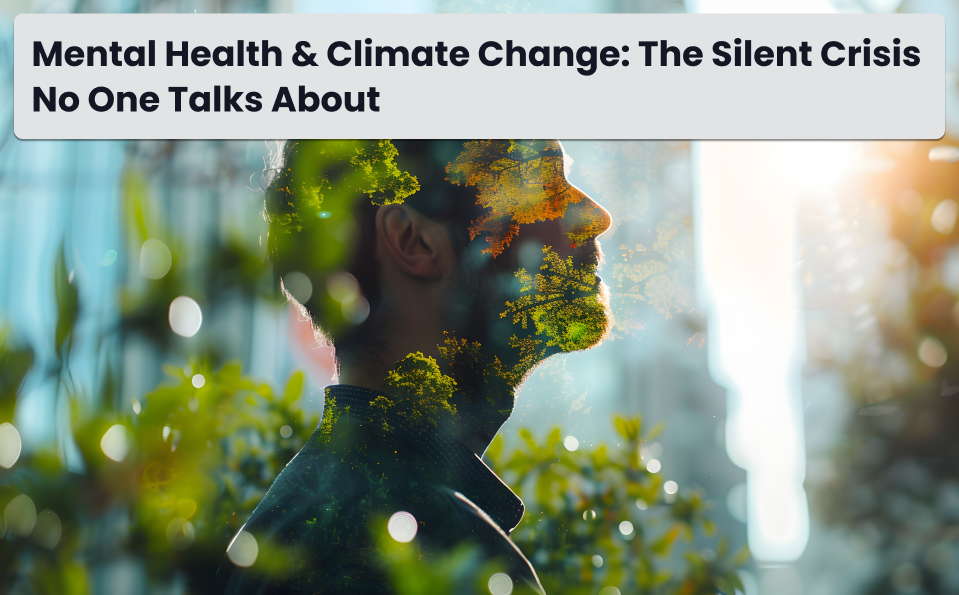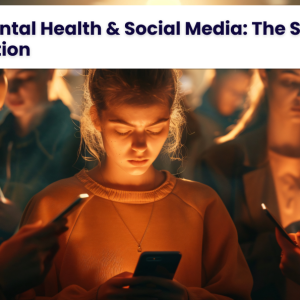
Mental Health & Climate Change: The Silent Crisis No One Talks About
Climate change and mental health are two of the world’s most urgent issues today. While much of the conversation around climate change has focused on physical health risks like heatstroke, respiratory diseases, and the destruction of ecosystems, the mental health impacts of this crisis are just as profound, yet often overlooked. The
World Health Organization (WHO) has already declared climate change a health crisis, but there’s a pressing need to shine a light on how it affects mental well-being. This article’ll explore how climate change impacts mental health, why addressing this crisis is difficult, and what solutions can build resilience for individuals and communities.
Disclaimer: The views expressed in this article are for informational purposes only and do not substitute professional medical advice. For any mental health concerns, we recommend consulting with a qualified healthcare provider.
How Climate Change Impacts Mental Health
1. Psychological Trauma from Climate-Related Disasters
Extreme weather events—hurricanes, wildfires, floods, and droughts—are becoming more intense due to climate change. These events can cause long-lasting psychological scars:
- Post-Traumatic Stress Disorder (PTSD): Survivors of disasters often relive traumatic events, experiencing flashbacks, nightmares, and heightened anxiety.
- Depression and Grief: Losing homes, loved ones, or livelihoods can lead to deep sadness, grief, and long-term depression.
- Acute Stress Disorders: Immediate reactions to disasters, like shock and panic, can evolve into chronic stress if left untreated.
If you or someone you know is experiencing these symptoms, we encourage seeking help from mental health professionals or support organizations.
2.Rising Eco-Anxiety
As the impacts of climate change become more apparent, especially to younger generations, many are experiencing eco-anxiety—a chronic fear and worry about the environmental future. This is fueled by feelings of helplessness and frustration, coupled with the perception that global responses are insufficient.
Resources to manage eco-anxiety: The Mental Health Foundation provides resources for managing eco-anxiety.
Why Addressing Climate-Induced Mental Health Issues Is Difficult
1. Attribution Challenges
It’s often difficult to directly link specific mental health conditions to climate change. Psychological disorders are influenced by various factors, such as pre-existing conditions, socioeconomic status, and cultural contexts. This makes it hard to pin down the exact impact of climate events on mental health.
2. Lack of Research and Awareness
Mental health issues related to climate change are often overlooked in climate discussions, which tend to focus on physical health and the immediate impacts of natural disasters. There is a significant gap in research about how climate change affects psychological well-being. Read more about climate-related mental health research here.
3. Misdiagnosis Risks
Common emotional responses to climate events—such as sadness, anxiety, and fear—are sometimes misinterpreted as clinical disorders. On the flip side, more severe mental health issues like PTSD or eco-anxiety might go unnoticed, as they don’t always show immediate signs.
Solutions: Building Resilience Against Climate Change’s Mental Health Effects
1. Integrating Mental Health into Climate Policies
Governments and organizations should focus on creating policies that address both climate change and its mental health impacts. Actions include:
- Establishing mental health support systems in disaster-prone areas.
- Training healthcare workers to recognize and treat climate-related mental health conditions.
- Allocating funding for research on the psychological effects of climate change.
2. Strengthening Community Resilience
Building community resilience is crucial in helping people cope with the psychological effects of climate change. Strategies include:
- Promoting community-based mental health programs focused on disaster preparedness and stress management.
- Building peer support networks that help people emotionally recover from traumatic events.
- Rebuilding communities with resilience in mind, using local resources to foster long-term recovery.
3. Raising Public Awareness
Educating the public about the mental health impacts of climate change is essential. Initiatives could include:
- Teaching people to recognize signs of PTSD, eco-anxiety, and depression.
- Providing resources for stress management for disaster survivors.
- Encouraging people to take meaningful climate action to combat feelings of helplessness.
4. Encouraging Cross-Disciplinary Research
Collaboration between mental health experts, environmental scientists, and policymakers is key to finding innovative solutions. For example:
- Identifying vulnerable populations and tailoring interventions to meet their needs.
- Developing tools to measure the mental health impact of climate events.
- Evaluating the effectiveness of resilience-building strategies.
The Role of Individuals and Communities
While governments and organizations play a critical role in addressing the mental health impacts of climate change, individuals also have the power to make a difference. Here’s how you can help:
- Reduce Your Carbon Footprint: Adopt sustainable practices like conserving energy, reducing waste, and supporting eco-friendly initiatives.
- Advocate for Change: Support policies that address both climate change and mental health, at local and national levels.
- Build Community Connections: Join local programs focused on disaster preparedness and recovery.
These actions not only combat climate change but also create a sense of empowerment, reducing eco-anxiety and fostering hope.Join local initiatives to fight climate change.
Key Takeaways
Climate change has far-reaching implications for mental health, contributing to conditions like PTSD, eco-anxiety, and depression. Addressing this crisis requires a multi-pronged approach that integrates mental health support into climate policies, strengthens community resilience, and raises public awareness. Collective action, from governments to individuals, is essential to mitigate the psychological impacts of climate change and build a healthier, more resilient global society.





